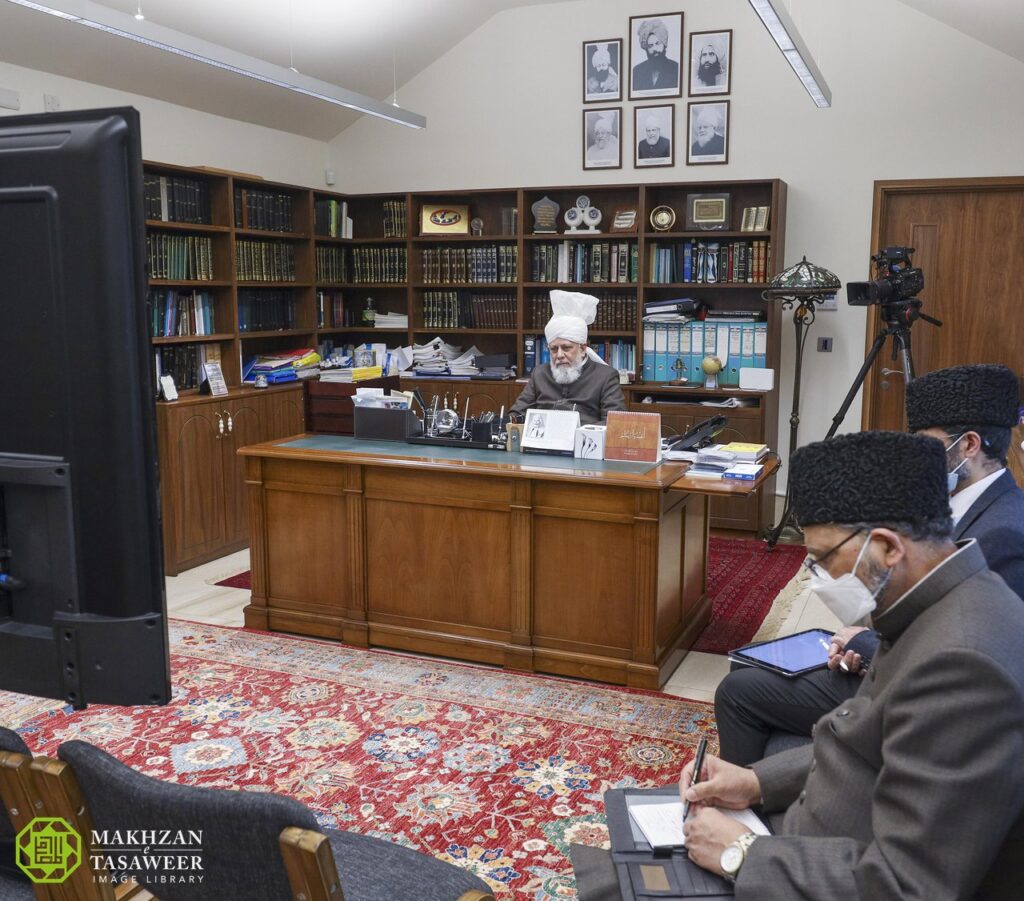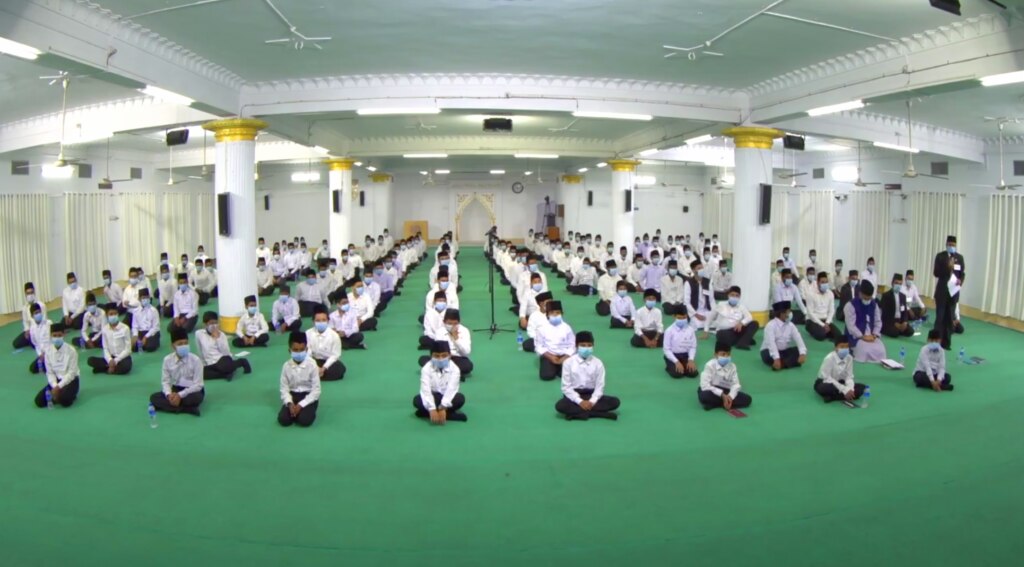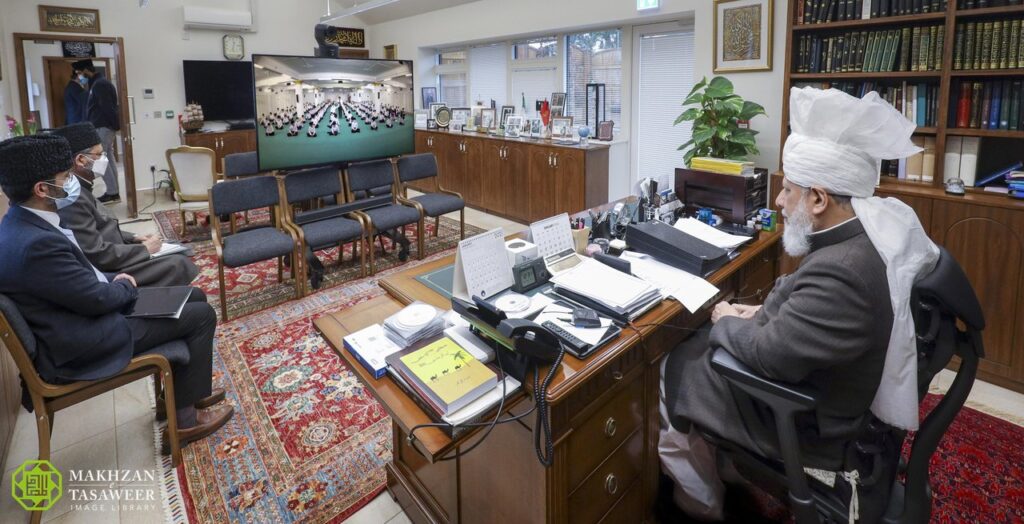On Saturday, 30 January 2021, waqifeen-e-nau Bangladesh had the good fortune of meeting with Hazrat Amirul Momineenaa in a virtual class.
The waqifeen-e-nau were gathered in Dar al-Tabligh Mosque in Dhaka, which also serves as the headquarters of the Ahmadiyya Muslim Jamaat in Bangladesh.

Secretary Waqf-e-Nau, Hasib Ahsan Sahib, in his opening remarks, expressed his gratitude to Huzooraa for granting this virtual meeting.
The class commenced with a recitation from the Holy Quran, which highlighted the vow and sacrifice of Mary’s mother.
Following this, a nazm composed by Hazrat Musleh-e-Maudra was delivered, after which a hadith of the Holy Prophetsa and an extract from the writings of the Promised Messiahas were presented.
Hazrat Khalifatul Masih Vaa then asked who would be translating for the waqifeen-e-nau and if any facility was made.
During the class, the waqifeen-e-nau had the opportunity to seek guidance on various matters and ask Hazrat Amirul Momineenaa an array of questions with regard to religion, faith, worldly matters and everyday issues.
The first question asked was with regard to the six articles of faith. A young waqif-e-nau asked Huzooraa what belief in khair and shar (good and bad) divine decrees meant.
Hazrat Amirul Momineenaa said:
“What is meant by khair and shar [in relation to divine decree]? When one holds the belief that if he commits good deeds, then he will receive a good reward from Allah and when he commits bad deeds, he will be punished. Thus, if one believes in this, man is prone to doing good rather than committing bad deeds and makes an effort to act in accordance with God’s commandments.”
Huzooraa very eloquently explained, “When one holds onto this belief, then one will refrain from committing bad deeds and will, instead, be inclined towards doing good deeds.”

Subsequently, a waqif-e-nau asked Huzooraa how one is able to uphold a true spirit of a life devotee and fight off worldly attractions.
Answering the question, Huzooraa said:
“Before your birth, your parents dedicated your life. You must realise this fact; after that, when you reach the age of 15, you renew the bond of Waqf-e-Nau. If you keep all these things in mind, then you will know that you are a waqf for the cause of the Jamaat and for that, the first and foremost duty of a waqif-e-nau is to obey, follow and practice the commandments of Allah the Almighty. Allah has given 700, or more, commandments in the Holy Quran.”
Hazrat Khalifatul Masih Vaa added:
“So, you can maintain the spirit of a waqif-e-nau when you realise this fact that you have to follow the commandments and the injunctions given to us in the Holy Quran by Allah the Almighty and the first and foremost is to offer your five daily prayers; the best way for boys to offer their five daily prayers is in congregation. This is the basic thing. If you are not doing this, you are not a true believer …
“… Keep in mind that you have to offer five daily prayers and pray to Allah fervently in those prayers that He saves you from all bad things and enables you to discharge your duties as a waqif-e-nau and follow all the commandments of Allah the Almighty.
“Secondly, you should also recite the Holy Quran daily; not only recite the Arabic text, but also try to learn the meaning of it.
“Also, try to maintain and establish a close bond with Khilafat. Always try to strengthen your bond with Khilafat. This can only be done if you are listening to all the addresses and speeches and whatever instructions given to you by the Khalifa of the time. So, in this way, you can strengthen your faith and in this way, you can be a good waqif-e-nau.”
After hearing Huzoor’saa answer, the waqif-e-nau requested Hazrat Khalifatul Masih Vaa to pray for him. Huzooraa replied, “Allah bless you.”
A young waqif-e-nau said that he had two questions. The first question he asked was why it was important to read the Holy Quran. The second question he innocently asked was why the world had been afflicted with the coronavirus.
Answering the questions, Huzooraa beautifully explained this in a manner that was easy for the young waqif-e-nau to understand. Firstly, with regard to why we should read the Holy Quran, Hazrat Khalifatul Masihaa asked the young boy which class he studied in and said:
“Why should one attend school? So that you may study and become well-educated. Similarly, Allah revealed the Holy Quran to the Holy Prophetsa, which is a complete code of life, so that man may read it and obey the instructions.” Huzooraa added, “As this is God’s [revealed] book, if we read it, He will also reward us.”
Alluding to the second question, Huzooraa said:
“The world is often afflicted with many calamities. At times, there is a breakout of typhoid or flu or some other illnesses. Sometimes, calamities are sent to the world so that mankind is reminded that God exists and so that they turn to God and seek His forgiveness.”
Whilst seeking guidance from Huzooraa, a waqif-e-nau stated that he had been recently appointed as a doctor in Africa and requested Huzooraa for guidance.
Offering direction, Hazrat Amirul Momineenaa stated, “Always remember that you are going there to provide your service in the way of Allah.”

Upon being asked if Hell was eternal or temporary, Huzooraa said:
“After this life, you have an eternal life. So, Hell is the place where a person is sent who has been given a punishment by Allah the Almighty. When he completes his punishment, Allah brings him out from that and then sends him to Heaven.
“There is a hadith that a time will come when there will be nobody in Hell. So, Allah is ever merciful and gracious. His mercy encompasses everything. He forgives all sins … ultimately, a time will come when there will not be anybody in Hell. But we should not think that because it is a temporary place, so we should commit sins in this world and go to Hell; no. You cannot even tolerate the smallest punishment of Hell. So, the best way is that you do good deeds so that Allah is pleased with your deeds and instead of sending you to Hell, He sends you to Heaven.”
Following this, a waqif-e-nau asked Hazrat Amirul Momineenaa about the types of entertainment a waqif-e-nau should take interest in.
Replying to this, Huzooraa said that a waqif-e-nau should not indulge in unhealthy forms of entertainment. Huzooraa added:
“There are various educational programmes available on the Internet and National Geographic programmes.” Huzooraa highlighted that there were certain indecent programmes one should refrain from. Similarly, there were unhealthy films that one should stay away from. Huzooraa explained that God has told us in the Holy Quran that offering Salat helps one stay away from indecency. Huzooraa added, “Instead of playing video games, such as Fortnite, though you are now older [for such games], it is best to play outdoor games”. Huzooraa explained that playing video games has a negative effect on the brain and body, whereas playing outdoors and exercising will ensure a positive impact on one’s body.
A waqif-e-nau asked Hazrat Khalifatul Masihaa what the significance of fatwa was in Islam when it is the final and complete law.
Huzooraa explained:
“Religion is complete, but there are some verses of the Holy Quran which you cannot understand. You need some interpretation of it. There were some verses [of the Holy Quran] that even the Companionsra could not understand and they used to ask the Holy Prophetsa for the meaning, although they knew Arabic very well and their Arabic at that time was very good.
“But despite that, there were some words they could not understand and they asked for its interpretation. So, in this way, you need some interpretation. This is why the Promised Messiahas has also written some interpretation of some of the verses of the Holy Quran; and even Hazrat Khalifatul Masih IIra has given a very lengthy, detailed commentary of some of the surahs [chapters] of the Holy Quran.
“So, by reading these [commentaries], you can understand the true meaning of the verses. For instance, we believe that the Holy Prophetsa is Khatam-un-Nabiyyin, last of the prophets and seal of the prophets, and no law-bearing prophet can come after him, but a subordinate prophet can come. This is the verse in the Holy Quran. But non-Ahmadis interpret Khatam-un-Nabiyyin to mean that he is the seal of the prophets and no prophet can come after him, whether he is a law-bearing prophet or a subordinate prophet. This is why they are not accepting the Promised Messiahas. So, for these things, you need some interpretation.”
Huzooraa added, “Arabic is a very vast language. Even one word can have different connotations. So, for that, you need somebody who is well-versed with the language who can help interpret.”
Further, Hazrat Amirul Momineenaa explained:
“In some particular cases, sometimes, people try to interpret something in their favour which is not the actual meaning. So, for that, you have to ask somebody, as I have already said, who is well-versed with the interpretation of the Holy Quran and who is well-versed with the Arabic language.”
A waqif-e-nau, who had recently been appointed in a hospital as a life devotee, requested Hazrat Amirul Momineenaa for prayers and guidance. Upon this, Huzooraa said:
“You must work hard and seek aid through prayer … A doctor must always remember that it is Allah the Almighty Who cures patients. Thus, whenever you examine a patient, you must first pray. Upon prescribing a medicine, you should writeهوا الشافي [He is the healer] on the prescription – I also mentioned this in my sermon once … when you offer Namaz, pray for your patients and talk to them in a polite manner.”
Upon being asked how one can eliminate laziness, Hazrat Amirul Momineenaa said:
“Determination. You must make it a point that you are not going to be lazy. Make a plan, daily chart, that you have to get up early in the morning for Fajr prayer. Ask your parents to wake you up for Fajr prayer; you can also use your phone alarm or clock alarm so that you get up early in the morning.
“Then, after offering the Fajr prayer, you should recite the Holy Quran – at least two to three rukus – and then also, in your prayer, you should pray to Allah that He removes your laziness. Then, make a chart that this is the work you are going to do during the day and follow that plan.
“If you follow this for one week, then in this way, you can remove your laziness. The foremost thing is determination. You must be determined to remove your laziness to get rid of it.”
Huzooraa then very beautifully and eloquently explained:
“A doctor can only prescribe medicine, but he cannot put medicine in your mouth forcefully. So, you have to get your treatment by yourself. Offer the five daily prayers on time and pray to Allah that He removes your laziness.”
After this, as the series of questions came to an end, Hazrat Khalifatul Masih Vaa asked the translator what he did for a living. He replied that he had graduated from Jamia in 2017 and was currently serving in the Bangla Desk.
Thereafter, Hazrat Amirul Momineenaa extended salaam to everyone.

